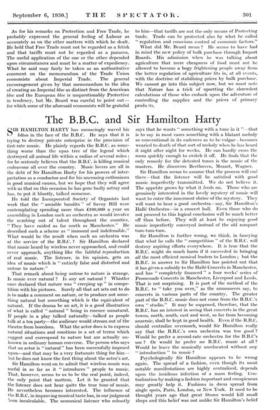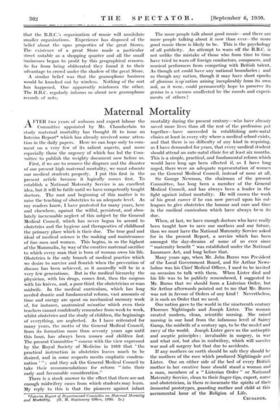The B.B.C. and S ir Hamilton Harty
SIR HAMILTON HARTY has menacingly waved Isis baton in the face of the B.B.C. He says that it is trying to destroy private enterprise in the provision of first-rate music. He plainly regards the B.B.C. as some- thing worse than the upas tree of the legend which destroyed all animal life within a radius of several miles ; for he seriously believes that the B.B.C. is killing musical endeavour all over the country. Music lovers arc all in the debt of Sir Hamilton Harty for his powers of inter- pretation as a conductor and for his unceasing enthusiasm in good musical causes, but we hope that they will agree with us that on this occasion he has gone badly astray and has, to put it bluntly, talked nonsense.
He told the Incorporated Society of Organists last week that the "amiable bandits" of Savoy Hill were contemplating spending more than £100,000 a year on assembling in London such an orchestra as would involve the combing out of talent throughout the counties. "They have raided as far north as Manchester." He described such a scheme as "immoral and indefensible." What would be the result when such an orchestra was at the service of the B.B.C. ? Sir Hamilton declared that music heard by wireless never approached, and could never approach, anything like the faithful reproduction of real music. The listener, in his opinion, gets an idea of music which is "entirely false and distorted and untrue to nature."
That remark about being untrue to nature is strange. Is music ever natural ? Is any art natural ? Whistler once declared that nature was " creeping up" in compe- tition with his pictures. Surely all that art sets out to do is to make a comment on nature, or to produce not some- thing natural but something which is the equivalent of natural. If the drama be an art, it is a good illustration of what is called " natural " being in essence unnatural. If people in a play talked naturally—talked as people talk at a tea party—the audience would stream out of the theatre from boredom. What the actor does is to express natural situations and emotions in a set of terms which suggest and correspond to nature but are actually un- known in ordinary human converse. The person who says that an actor is "natural" has been successfully imposed upon—and that may be a very fortunate thing for him— hut he does not know the first thing about the actor's art.
Sir Hamilton went on to admit that wireless music was useful in so far as it " introduces " people to music. That, however, seems to us to be the real point, indeed, the only point that matters. Let it be granted that the listener does not hear quite the true tone of music. He nevertheless becomes interested. The influence of the B.B.C. in improving musical taste has, in our judgment been incalculable. The unmusical listener who robustly says that he wants "something with a tune in it "—that is to say in most cases something with a blatant melody so conventional in its cadences as to be vulgar—becomes wearied to death of that sort of melody when he has heard it night after night for weeks. He can hardly cross the room quickly enough to switch it off. He finds that the only remedy for the detested tunes is the music of the masters. He discovers Beethoven, Mozart, Wagner.
Sir Hamilton seems to assume that the process will end there—that the listener will be satisfied with good music imperfectly transmitted. We do not believe it. The appetite grows by what it feeds on. Those who are genuinely interested in the lovely mystery of music will want to enter the innermost shrine of the mystery. They will want to hear a good orchestra—say, Sir Hamilton's Halle Orchestra—in a concert hall. Even those who do not proceed to this logical conclusion will be much better off than before. They will at least be enjoying good music imperfectly conveyed instead of the old rampant turn-turn-turn.
Sir Hamilton is further wrong, we think, in fancying that what he calls the " competition " of the B.B.C. will destroy aspiring efforts everywhere. It is true that the B.B.C. might do much harm if it succeeded in bringing all the most efficient musical leaders to London ; but the B.B.C. in answer to Sir Hamilton has pointed out that it has given a subsidy to the Halle Concerts in Manchester, and has "completely financed" a four weeks' series of Promenade Concerts in Manchester, Liverpool and Leeds. That is not surprising. It is part of the method of the B.B.C. to "take you over," as the announcers say, to concerts in various parts of the country. The greater part of the B.B.C. music does not come from the B.B.C.'s own " studio." It may be supposed, therefore, that the B.B.C. has an interest in seeing that concerts in the great towns, north, south, east and west, so far from becoming anaemic, shall be kept in good health. Even if the B.B.C. should centralize overmuch, would Sir Hamilton really say that the B.B.C.'s own orchestra was too good ? Would he prefer a second-rate orchestra for the B.B.C's use ? Or would he prefer no B.B.C. music at all ? Would he leave the musically uneducated without any " introduction " to music ?
Psychologically Sir Hamilton appears to be wrong again. The spread of a fashion, even though its most notable manifestations are highly centralized, depends upon the insidious infection of a mass feeling. Cen- tralization by making a fashion important and conspicuous may greatly help it. Fashions in dress spread from single spots, Paris, London, or New York. It used to be thought years ago that great Stores would kill small Shops and this belief was not unlike Sir Hamilton's belies that the B.B.C.'s organization of music will annihilate smaller organizations. Experience has disposed of the belief about the upas properties of the great Stores. The existence of a great Store made a particular street notable as a shopping quarter and all the small businesses began to profit by this geographical renown. So far from being obliterated they found it to their advantage to crowd under the shadow of the great Store.
A similar belief was that the gramophone business would be knocked out by wireless. Nothing of the sort has happened. One apparently reinforces the other. The B.B.C. regularly informs us about new gramophone records of note. The more people talk about good music—and there are more people talking about it now than ever—the more good music there is likely to be. This is the psychology of all publicity. An attempt to warn off the B.B.C. is not unlike the mistake of those who from time to time have tried to warn off foreign conductors, composers, and musical performers from competing with British talent. As though art could have any national boundaries ; and as though any nation, though it may have short epochs of glorious is sp:ration arising inexplicably from its own soil, as it were, could permanently hope to preserve its genius in a vacuum unaffected by the moods and experi- ments of others !































 Previous page
Previous page